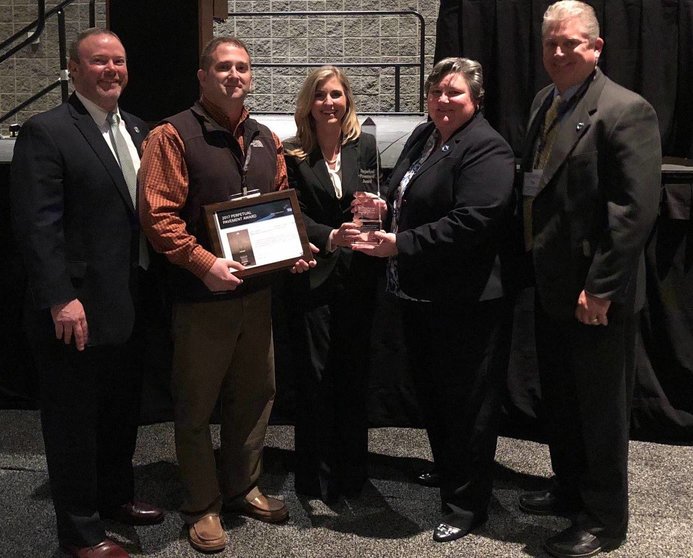SCDOT Wins 2017 Perpetual Pavement Award
![]() Print this Article | Send to Colleague
Print this Article | Send to Colleague

SCDOT Honored for Success of Long-Life Asphalt Section of Interstate 95
The South Carolina Department of Transportation (SCDOT) was awarded a 2017 Perpetual Pavement Award by the Asphalt Pavement Alliance (APA) for a nine-mile section of Interstate 95 in Jasper County. This is SCDOT’s seventh Perpetual Pavement Award in 14 years.
To qualify for this prestigious award, a pavement must be at least 35 years old and never suffered a structural failure. The average interval between resurfacing of each winning pavement must be no less than 13 years. The pavement must demonstrate the characteristics expected from long-life, Perpetual Pavement design: excellence in design, quality in construction and value to taxpayers.
Engineers at the National Center for Asphalt Technology (NCAT) at Auburn University in Auburn, Alabama, evaluated the nominations and validated the results for the Perpetual Pavement Award winners.

The award-winning section of Interstate 95 runs from just north of US 17/Jacob Smart Boulevard (MM 23) in Ridgeland to US 17/Kings Highway (MM 32) in Yemassee. SCDOT originally built the pavement between 1969 and 1973 with a 6-inch-thick HMA sand-asphalt mix base containing relatively high asphalt content. With this resilient, fatigue-resistant base, the road structure has required resurfacing (Mill and Fill) just twice in 44 years with no net structural gain since original construction. The resurfacing by Mill and Fill of 2 inches occurred in the early to mid-1980s and again in early to mid-1990s.
"Although the concepts of Perpetual Pavement were not known at the time Interstate 95 was designed, this pavement was built with a 6-inch-thick sand asphalt base containing relatively high asphalt content," said Eric Carroll, P.E., SCDOT assistant pavement design engineer. "In many respects, we feel that Interstate 95 is not special, but represents the typical long-lasting, low-maintenance flexible pavements we have built for many years, and we believe this design resulted in a resilient, fatigue-resistant base that follows the Perpetual Pavement concept. Thanks to careful engineering, good materials, and attention to quality, pavements like this have made South Carolina one of the top-ranking states in interstate condition despite having one of the lowest per mile expenditures among state transportation agencies."
As a winner of a 2017 Perpetual Award, SCDOT will receive an engraved crystal obelisk, and its name and project will be added to a plaque on permanent display at the NCAT Research Center at Auburn University. "One of the keys to sustainability is long life," said Amy Miller, P.E., national director of the Asphalt Pavement Alliance. "Asphalt roads can be engineered to last indefinitely with only routine maintenance and periodic surface renewal."
"The advantages of these Perpetual Pavements are significant. Life-cycle costs are lower because deep pavement repairs and reconstruction are avoided. User delays are reduced because minor surface rehabilitation requires shorter work windows and can avoid peak traffic hours. And there are environment benefits because minimal rehabilitation, combined with recycling any materials that are removed from the pavement surface, reduces the amount of material resources required over the pavement’s life."
The Asphalt Pavement Alliance (www.driveasphalt.org) is a partnership of the Asphalt Institute (AI), National Asphalt Pavement Association (NAPA) and the State Asphalt Pavement Associations. The Asphalt Pavement Alliance’s mission is to establish asphalt as the preferred choice for quality, performance and the environment. The Asphalt Institute (www.asphaltinstitute.org) is the international trade association of petroleum asphalt producers, manufacturers and affiliated businesses. AI promotes the use, benefits and quality performance of petroleum asphalt, through engineering, research, marketing and educational activities. The National Asphalt Pavement Association (www.asphaltpavement.org) represents the interests of U.S. asphalt producers/contractors before Congress, federal agencies, and other national trade and business organizations. NAPA supports an active research program designed to improve the quality of asphalt pavements and paving techniques used in the construction of roads, streets, highways, parking lots, airports, and environmental and recreational facilities.
The State Asphalt Pavement Associations (www.asphaltpavement.org/sapas) represent the interests of asphalt pavement producers and paving companies at the state and local level across the United States.
